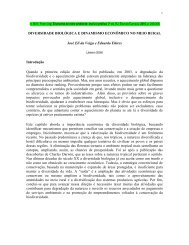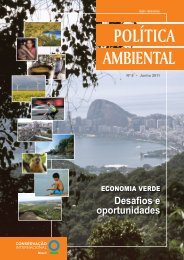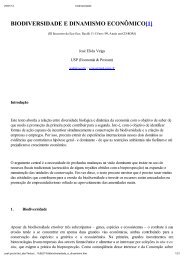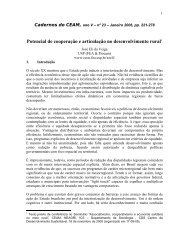sustainable development 20 years on from the ... - José Eli da Veiga
sustainable development 20 years on from the ... - José Eli da Veiga
sustainable development 20 years on from the ... - José Eli da Veiga
You also want an ePaper? Increase the reach of your titles
YUMPU automatically turns print PDFs into web optimized ePapers that Google loves.
22<br />
productivity and <strong>the</strong> integrity of fishery or forestry reserves, to menti<strong>on</strong> just a few. Government<br />
coordinati<strong>on</strong> failings result in policy inc<strong>on</strong>sistencies, such as investing in envir<strong>on</strong>mental protecti<strong>on</strong>,<br />
while at <strong>the</strong> same time supporting activities with high and sometimes irreversible envir<strong>on</strong>mental<br />
costs (externalities). 6<br />
The key <str<strong>on</strong>g>sustainable</str<strong>on</strong>g> <str<strong>on</strong>g>development</str<strong>on</strong>g> challenges facing <strong>the</strong> regi<strong>on</strong> remain <strong>the</strong> same as before, but are<br />
situated in a new and more demanding c<strong>on</strong>text of climate change and a rearrangement of global ec<strong>on</strong>omic<br />
power. The challenges are to eradicate poverty and eliminate inequalities; reverse <strong>the</strong> destructi<strong>on</strong> of<br />
ecosystems that provide habitat for <strong>the</strong> regi<strong>on</strong>’s rich biological diversity and a source of income for local<br />
populati<strong>on</strong>s; achieve local <str<strong>on</strong>g>development</str<strong>on</strong>g> (both rural and urban) that guarantees human security and<br />
satisfies <strong>the</strong> ec<strong>on</strong>omic needs of <strong>the</strong> citizens of <strong>the</strong> regi<strong>on</strong>’s countries; and c<strong>on</strong>soli<strong>da</strong>te instituti<strong>on</strong>s that<br />
ensure c<strong>on</strong>tinuous improvement in integrating <strong>the</strong> three spheres of <str<strong>on</strong>g>development</str<strong>on</strong>g> and prevent backsliding<br />
in adverse situati<strong>on</strong>s, by promoting full participati<strong>on</strong> by key actors such as women, young people and<br />
indigenous peoples, am<strong>on</strong>g o<strong>the</strong>rs.<br />
Poverty, hunger, soil degra<strong>da</strong>ti<strong>on</strong> and overexploitati<strong>on</strong> of natural resources are part of a vicious<br />
cycle that generates deep crises in food security, human <str<strong>on</strong>g>development</str<strong>on</strong>g> and sustenance, since most people<br />
with high rates of vulnerability, marginality and food insecurity live <strong>on</strong> land and in ecosystems that are<br />
fragile and degraded.<br />
Fur<strong>the</strong>rmore, <strong>the</strong> regi<strong>on</strong> also faces new challenges, many of which seemed less urgent at <strong>the</strong> time<br />
of <strong>the</strong> Earth Summit. Hence <strong>the</strong> importance of making progress <strong>on</strong> climate change a<strong>da</strong>ptati<strong>on</strong>, which<br />
requires acti<strong>on</strong> in different domains practically throughout <strong>the</strong> regi<strong>on</strong>.<br />
The good news is that <strong>the</strong> situati<strong>on</strong> in Latin America and <strong>the</strong> Caribbean to<strong>da</strong>y is very different<br />
<strong>from</strong> what it was in 1972, when <strong>the</strong> envir<strong>on</strong>ment appeared <strong>on</strong>ly very marginally <strong>on</strong> <strong>the</strong> public agen<strong>da</strong>;<br />
or in 1992, when <strong>the</strong> regi<strong>on</strong> was emerging <strong>from</strong> a “lost decade” of low growth, high inflati<strong>on</strong> and<br />
external debt c<strong>on</strong>straints; or in <str<strong>on</strong>g>20</str<strong>on</strong>g>02, when it was emerging <strong>from</strong> a decade of reforms that had<br />
weakened government structures and was facing new ec<strong>on</strong>omic crises. Despite <strong>the</strong> recent world<br />
ec<strong>on</strong>omic upheaval, <strong>the</strong> regi<strong>on</strong> has enjoyed nearly a decade of relatively high growth; inflati<strong>on</strong> is under<br />
c<strong>on</strong>trol in nearly all countries and, in general, stable ec<strong>on</strong>omic c<strong>on</strong>diti<strong>on</strong>s prevail. The ec<strong>on</strong>omic<br />
situati<strong>on</strong>, combined with a new wave of social policies, has made it possible to reduce poverty indices.<br />
States are more robust, and <strong>the</strong> regi<strong>on</strong> is playing an increasingly important role in <strong>the</strong> world ec<strong>on</strong>omy.<br />
Some countries have started to reinforce <strong>the</strong>ir policies <strong>on</strong> productive <str<strong>on</strong>g>development</str<strong>on</strong>g>, innovati<strong>on</strong>, science<br />
and technology, and have returned to <str<strong>on</strong>g>development</str<strong>on</strong>g> planning. In much of <strong>the</strong> regi<strong>on</strong> <strong>the</strong>re is still an<br />
opportunity to take advantage of <strong>the</strong> demographic dividend by investing in universal access to basic<br />
services and quality educati<strong>on</strong> (see chapter I). Latin America and <strong>the</strong> Caribbean is thus better placed<br />
than ever to lay <strong>the</strong> foun<strong>da</strong>ti<strong>on</strong>s for change towards sustainability.<br />
6<br />
Externalities are external impacts of a given ec<strong>on</strong>omic activity <strong>on</strong> <strong>the</strong> envir<strong>on</strong>ment and social well-being which<br />
are not measured through <strong>the</strong> pricing system. In o<strong>the</strong>r words, <strong>the</strong> social cost of <strong>the</strong> impact or <strong>the</strong> envir<strong>on</strong>mental<br />
<strong>da</strong>mage caused by <strong>the</strong> ec<strong>on</strong>omic activity is not reflected in its cost structure or in <strong>the</strong> price of <strong>the</strong> product<br />
resulting <strong>from</strong> <strong>the</strong> activity. In fact, society is implicitly subsidizing <strong>the</strong> product to <strong>the</strong> extent of <strong>the</strong> cost of <strong>the</strong><br />
social loss or externality incurred as a result of its producti<strong>on</strong> (Acquatella and Bárcena, <str<strong>on</strong>g>20</str<strong>on</strong>g>05, page 30). The<br />
challenge that arises in this regard is to effectively internalize this external cost in <strong>the</strong> pricing system.













